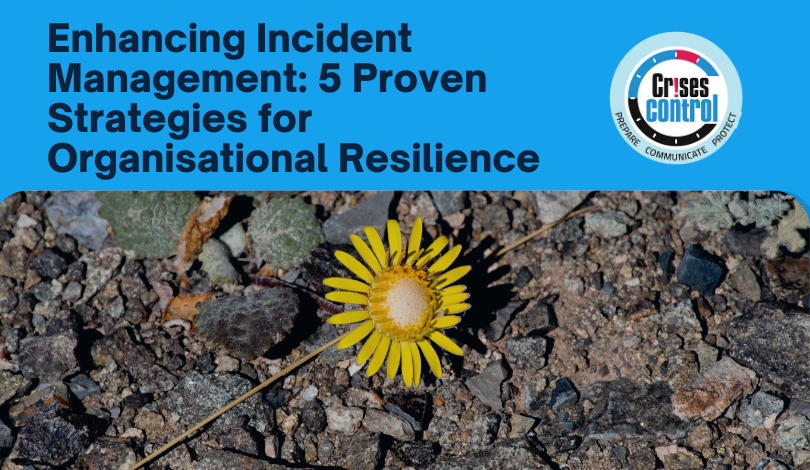Building organisational resilience is a multifaceted process that extends far beyond simply having a plan in place. It requires a meticulous alignment of various elements and fostering a culture of awareness throughout the entire organisation. unforeseen incidents and crises are not mere possibilities but inevitable challenges that can disrupt operations, damage reputations, and threaten the very survival of organisations. To navigate these treacherous waters, having a robust incident management system in place is not just a luxury but an absolute necessity. It’s the difference between chaos and control, between recovery and ruin.
In this blog, we will delve into five proven strategies that can fortify your organisation’s incident management capabilities, empowering you to swiftly respond, mitigate risks, and emerge stronger from any crisis that comes your way. Get ready to unlock the keys to organisational resilience and ensure a future where you can confidently weather any storm.
Understanding Incident Management
Before diving into the strategies, it is essential to grasp the fundamentals of incident management. Incident management involves a series of activities aimed at effectively handling and resolving disruptive incidents. Its primary objectives include minimising downtime, ensuring the safety of employees and stakeholders, preserving business continuity, and protecting the organisation’s reputation.
Crisis management plays a vital role in incident management. While incident management focuses on immediate response and recovery, crisis management takes a broader perspective by addressing the long-term consequences of incidents and working towards preventing similar incidents in the future.
Proven Strategies for Organisational Resilience
To achieve organisational resilience, organisations must adopt proactive strategies that empower them to withstand and recover from incidents efficiently. Here are five proven strategies that can significantly enhance incident management and organisational resilience:
Strategy 1: Risk Assessment and Preparedness
A solid foundation for incident management starts with a comprehensive risk assessment. By identifying potential risks and vulnerabilities, organisations can develop tailored response plans and establish preventive measures. Conducting regular risk assessments allows businesses to proactively address potential threats, ensuring they are well-prepared to respond swiftly and effectively when incidents occur.
Strategy 2: Effective Communication and Collaboration
Clear and efficient communication is critical during incidents. Establishing effective communication channels and protocols helps disseminate information promptly, enabling stakeholders to make informed decisions and take appropriate actions. Collaboration tools and platforms facilitate real-time collaboration, allowing teams to coordinate their efforts and streamline incident response processes.
Strategy 3: Training and Skill Development
Organisations should invest in comprehensive training programs to equip employees with the necessary skills to handle incidents effectively. Training should cover various aspects of incident management, including incident identification, response protocols, and crisis communication. By providing regular training and conducting simulations, organisations can enhance their incident response capabilities and build a culture of preparedness.
Strategy 4: Technology and Automation
Leveraging technology and automation can significantly improve incident management processes. Incident management platforms, like Crises Control, offer advanced features such as automated alerting, incident tracking, and task assignment. These tools streamline incident response, reduce manual efforts, and enable organisations to respond rapidly and efficiently.
Strategy 5: Continuous Improvement and Learning
Organisational resilience requires a culture of continuous improvement and learning from past incidents. After each incident, organisations should conduct thorough post-incident reviews to identify areas for improvement. By analysing root causes, identifying lessons learned, and implementing corrective actions, organisations can enhance their incident management practices over time.
Implementing Incident Management with Crises Control
Crises Control provides a comprehensive incident management solution that empowers organisations to streamline their incident response efforts. With its intuitive user interface and powerful features, Crises Control simplifies incident reporting, alerting, and communication, enabling organisations to respond swiftly and effectively to any disruptive event.
Key features of Crises Control include:
- Automated incident alerts and notifications
- Centralised incident tracking and management
- Real-time collaboration and communication tools
- Integration with external systems and data sources
- Customizable incident response workflows
- Incident reporting and analytics for post-incident review
By implementing Crises Control, organisations can enhance their incident management capabilities, reduce response times, and improve overall resilience.
In conclusion, incident management is a critical aspect of organisational resilience. By adopting the five proven strategies discussed in this blog, organisations can effectively enhance their incident response capabilities and mitigate the impact of disruptive events. Embracing a proactive approach to incident management ensures that businesses can swiftly recover, minimise downtime, protect their reputation, and maintain continuity in the face of adversity.
To start using Crises Control’s features to strengthen your resilience, get in touch with one of our experts or request a demo today.







